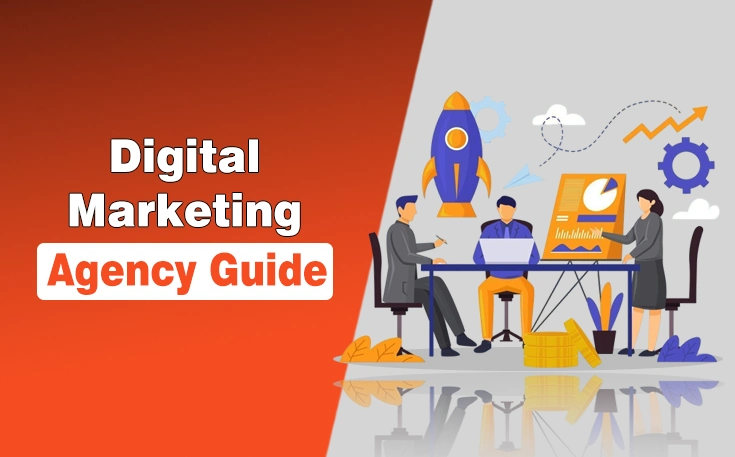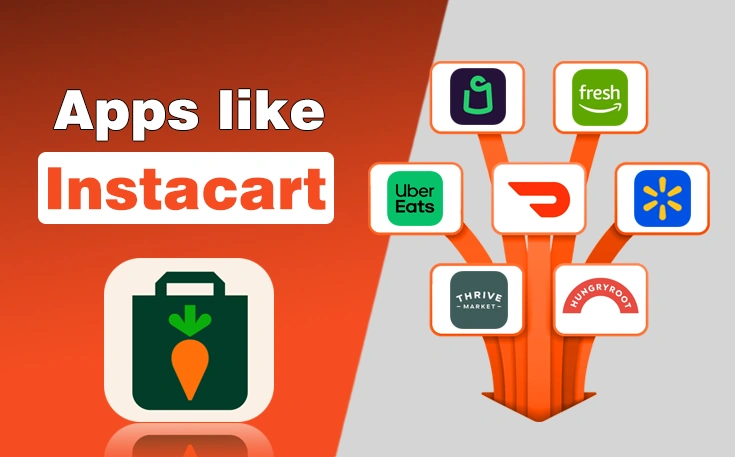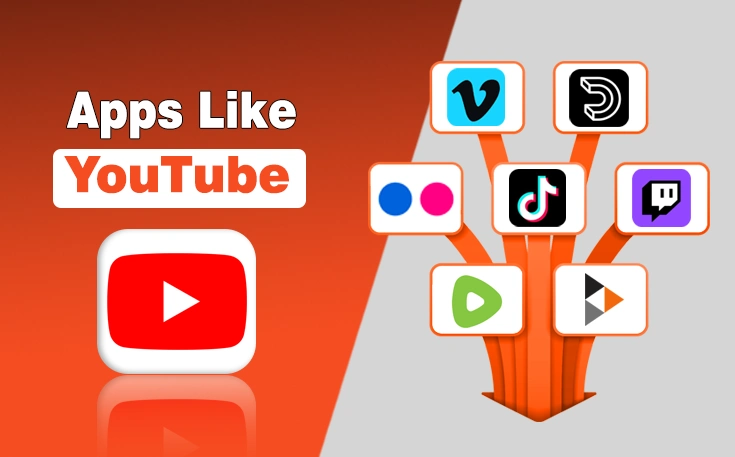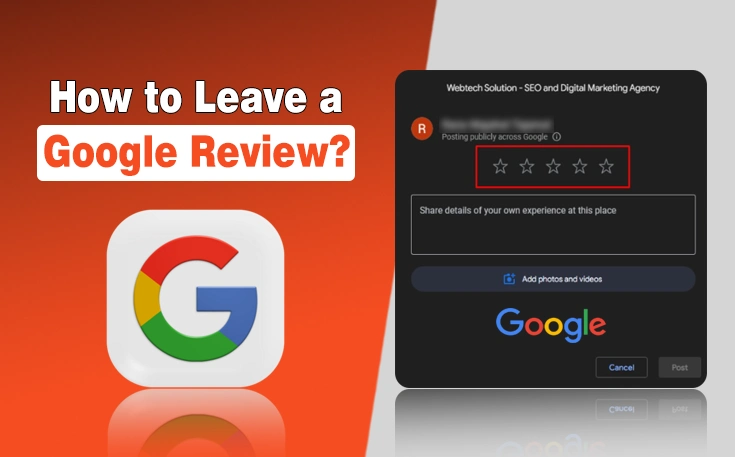If you’re looking to make an impact and take your brand to the next level, you’re in the right place.
A digital marketing agency helps businesses grow, adapt, and thrive in this ever-evolving digital world.
But do you know how digital marketing agencies help brands climb search engine rankings or what kind of services they offer? Not sure! Worry not, I’ll briefly guide you about digital marketing agencies, their services, strategies and how they take hold of businesses to grow.
I have been running this digital marketing agency, Webtech Solutions, for more than 10 year,s and I have been providing different services to businesses to expand their reach and revenuee.
Based on my journey experience I dive deep in this guide to discuss the core of digital marketing, breaking down the services, strategies, and tools that can truly make a difference for your business.
Let’ walk step by step with me to know briefly.
What Is a Digital Marketing Agency?
A digital marketing agency is a business that delivers marketing services by using digital channels such as search engines, websites, email, social media, and mobile apps.
But there is more to it than just platform knowledge. These agencies deploy strategies, tools, analytics, and conversion-focused frameworks to help clients acquire, convert, and retain customers.
They also provide full-stack digital services that blend creative, data, and technology. Many agencies today offer specialization in verticals like e-commerce, SaaS, healthcare, or fintech.
Why Businesses Need Digital Marketing Agencies
Digital marketing has evolved into a powerhouse of brand visibility, customer engagement, and ROI-driven performance. As a founder, marketer, or business strategist, I have realized one thing very early: without a proper digital strategy backed by skilled professionals, you are leaving money on the table.
Let’s talk about the ‘why’ behind outsourcing digital marketing.
We at Webtech Solutions, as a digital marketing agency, have worked with in-house teams, freelancers, and agencies, and the difference comes down to three things: scalability, skill diversity, and technology stack. Agencies offer:
- Cross-functional teams of SEO specialists, ad buyers, data scientists, UX designers, and content strategists
- Access to enterprise-level tools (Ahrefs, SEMrush, Hotjar, Marketo, Salesforce Marketing Cloud, HubSpot)
- A/B testing and CRO capabilities to improve conversion rates
- Scalability during seasonal campaigns or product launches
- Creative storytelling and multimedia production
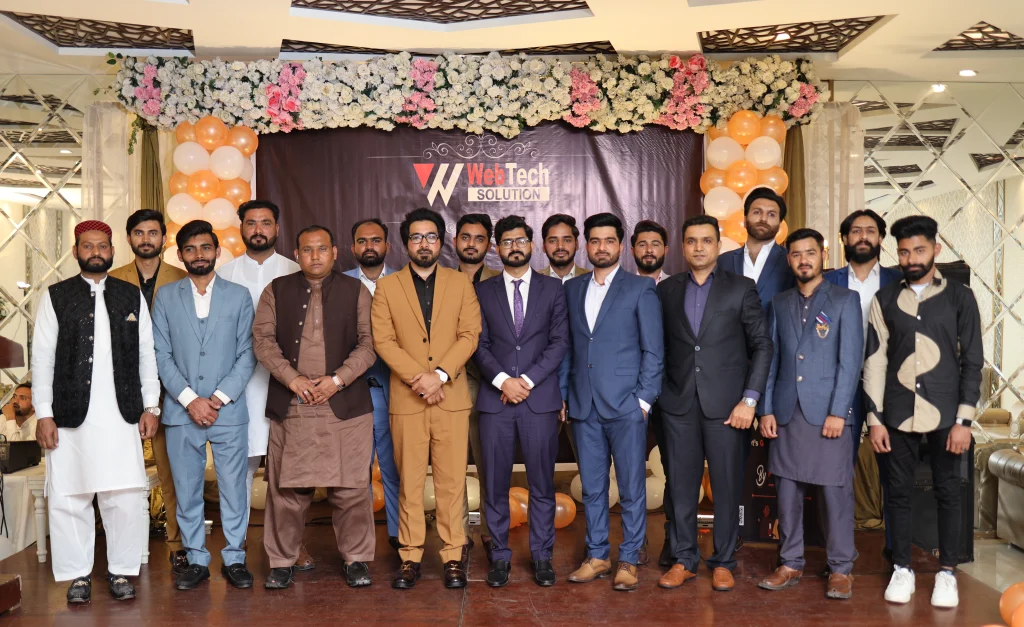
Core Services Offered by a Digital Marketing Agency
Now, it’s time to go beyond the basic list and understand how agencies implement each service using technical tools, frameworks, and data.
We at Webtech Solutions offering all these services to different needs of businesses. So, what are these services? learn here!
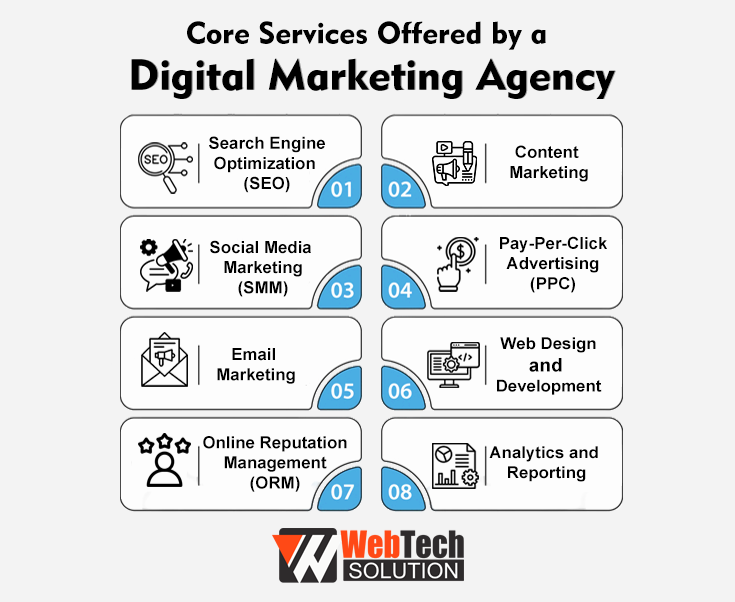
1. Search Engine Optimization (SEO)
SEO today is not just about stuffing keywords. It is about technical infrastructure, algorithm understanding, and user intent alignment.
Key Deliverables:
- Technical SEO Audit: Using tools like Screaming Frog, Sitebulb, and Google Search Console to identify crawl issues, canonical problems, and mobile usability.
- Core Web Vitals Optimization: Improving LCP, CLS, and FID using Lighthouse reports and reducing JS bloat.
- On Page SEO: Implementing schema markup, optimizing internal linking structure, and content gap analysis with Surfer SEO.
- Off Page SEO: Strategic link building using digital PR, HARO outreach, and analyzing backlink profiles via Ahrefs Backlinks Checker.
- SEO Automation: Creating dynamic sitemaps, log file analysis, and task automation using Python for large-scale websites.
- Semantic SEO: Collecting all the relevant keywords and adding them to the article to make it SEO friendly content and optimize it for search engines.
- Local SEO: Optimizing the website to appear in the local search results and generate leads and sales, and increase revenue.
2. Content Marketing
Content Marketing is another key service that digital marketing agency offer. To simply put, content is not just blogging. Besides creating high quality content, agencies create a content funnel mapped to the customer journey using frameworks like TOFU-MOFU-BOFU.
Additionally, they implement different content marketing tools to grab the ideas and then create content accordingly.
Core Techniques
- Content clustering and pillar page creation for topic authority
- NLP based optimization using Frase or Clearscope
- Video scripting, production, and optimization on YouTube SEO
- Whitepaper, eBook, and webinar funnel integration into CRM
3. Social Media Marketing (SMM)
Effective Social Media Marketing goes beyond posting creatives. Agencies build data driven personas and use pixel-based remarketing.
Advanced Practices
- Paid social media platforms funnels (cold traffic to retargeting) using Facebook Ads Manager, LinkedIn Campaign Manager
- Community management with marketing tools like Sprout Social or Hootsuite
- Influencer vetting using Upfluence and BuzzSumo
- Social sentiment analysis using Brandwatch
4. Pay-Per-Click Advertising (PPC)
Pay Per Click is about scientific bidding and intent focused ads. Agencies integrate Google Ads with data layers and track micro-conversions.
Key Inclusions
- Full campaign setup such as SKAGs, responsive search ads, display remarketing
- Conversion tracking using Google Tag Manager and Enhanced Conversions
- ROAS-based bid automation and audience segmentation
- Funnel optimization with post-click landing page A/B testing (Unbounce, Instapage)
5. Email Marketing
Email marketing includes sending promotional messages directly to the inbox of the targeted audience. Digital Marketing agencies treat email as a behavior-driven conversion asset, not just a communication channel. They analyze the customers’ behavior and send personalized emails to generate leads for your brand.
Execution Includes
- Lifecycle email automation (welcome, cart abandonment, re-engagement) via email marketing tools such as Klaviyo, Mailchimp, or HubSpot
- Email segmentation based on RFM (Recency, Frequency, Monetary) modeling
- A/B split testing for subject lines, content, CTAs
- Deliverability monitoring using Postmark and Mailtrap
6. Web Design and Development
Web design today means responsive, conversion focused, and SEO optimized frontends. Agencies use CRO principles and analytics data to optimize UX.
Technical Stack Often Includes:
- JAMstack (JavaScript, APIs, Markup) for fast-loading static websites
- Headless CMS like Strapi or Sanity
- Conversion-focused UI using Figma prototypes tested via Hotjar and Crazy Egg heatmaps
- Frontend frameworks (React.js, Vue.js) + backend integrations (Node.js, Firebase, REST APIs)
7. Online Reputation Management (ORM)
Online reputation management is critical in review-centric markets. Digital Marketing agencies offer these services to make sure you can sustain a good image in the competitive marketplace and pocket massive perks.
Advanced ORM Features
- Review generation strategies using automated follow-up sequences
- Sentiment monitoring across platforms using ReviewTrackers or Reputation.com
- Crisis communication playbooks and keyword-based brand monitoring
8. Analytics and Reporting
Agencies don’t just send monthly reports. They create dashboards, custom attribution models, and growth projections.
Included Tools and Models
- Google Looker Studio dashboards with multi-channel attribution
- Tag Manager deployment of GA4 events
- KPI-based reporting frameworks aligned with OKRs
- Predictive analytics with AI tools (PaveAI, Windsor.ai)
Advanced Strategy Framework for Sustainable Digital Growth
How Digital Marketing Agencies Build Strategy for Digital Growth?
At WebTech Solutions, we know one size does not fit all when it comes to digital marketing. That’s why the strategies we follow are carefully crafted for each client to ensure we address their unique needs and goals. These are not just any strategies. We have spent years perfecting them, and they have been a huge part of the success stories we have helped create.
So, what makes these strategies special? Well, they have been tested, refined, and proven to work. Whether it is understanding your audience better, mapping out your customer journey, or integrating the latest tech tools, these steps are what we use to drive growth for businesses just like yours. Let’s break it down, step by step, and see how digital marketing agencies like WebTech Solution help businesses transform their digital marketing efforts for lasting success.
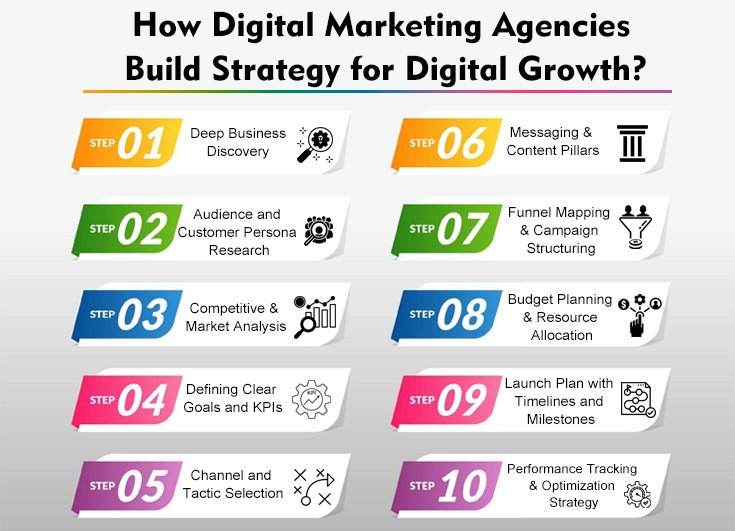
Step 1: Deep Business Discovery
Every good strategy starts with understanding your business inside and out. This is not just a quick call or questionnaire. It is an in-depth dive.
Key Focus Areas:
- What products or services are your top priorities?
- Who are your most valuable customers?
- What are your current marketing pain points?
- Where are your revenue goals set for the next quarter or year?
During this discovery phase, a smart agency listens more than they talk. They are gathering insights that will shape every decision moving forward.
Step 2: Audience and Customer Persona Research
If you are marketing to everyone, you are really marketing to no one. That’s why this step is so crucial.
Here’s what agencies typically do:
- Build detailed customer personas based on demographics, behaviors, and pain points
- Use existing customer data (CRM or analytics) to identify high-value segments
- Interview your customers or sales team to understand real-world buyer journeys
- Tap into platforms like Google Analytics, Facebook Insights, or SEMrush for behavioral data
By the end of this step, the agency should have a crystal-clear idea of who they are targeting and and how those people make decisions.
Step 3: Competitive & Market Analysis
Now it is time to look outward. A great strategy doesn’t exist in a vacuum. Agencies analyze what your competitors are doing, what they are doing poorly, and where your brand can carve out space.
Common tools and methods include:
- SEO audits of competitor websites
- PPC ad analysis using platforms like SpyFu or SimilarWeb
- Social media listening to see what kind of content your audience engages with
- Reviewing industry trends and content gaps
This step uncovers opportunity zones: low KD keywords no one is ranking for, platforms your competitors are ignoring, or audiences they are failing to reach.
Step 4: Defining Clear Goals and KPIs
No strategy is complete without goals – and not just “get more traffic.” The best agencies help you define specific, trackable KPIs tied directly to business growth.
Sample goal-setting breakdown:
- Top of Funnel: Increase organic traffic by 35% in 6 months
- Middle of Funnel: Improve landing page conversion rate from 2.5% to 4%
- Bottom of Funnel: Generate 120 qualified leads from PPC each month
- Retention goal: Achieve 20% increase in email open rates over 90 days
Every action taken during execution will link back to these KPIs, so you always know what is working.
Step 5: Channel and Tactic Selection
Here is where things get practical. Agencies do not throw spaghetti at the wall. They prioritize the right platforms based on your goals, audience, and budget.
Examples:
- A B2B SaaS startup might get an SEO and LinkedIn content strategy
- An eCommerce brand could start with Google Shopping and Instagram ads
- A local service business might need local SEO, along with Google Ads and email automation
The key is picking the right mix, instead of trying to do everything at once. Agencies typically roll this out in phases.
Step 6: Messaging & Content Pillars
Once the channels are selected, digital marketing agencies create a messaging framework. This ensures your brand voice stays consistent across every campaign.
This includes:
- Brand tone of voice (authoritative, friendly, casual, formal, etc.)
- Key value propositions tailored to each persona
- Core content themes or “pillars” that all content ties back to
For example, if you run a fitness app, your pillars might be: workout science, motivation, nutrition, and user success stories.
Step 7: Funnel Mapping & Campaign Structuring
Now we are getting strategic. Agencies do not just build ads and blogs. They build funnels which help in structuring and mapping the whole journey of the customers.
A funnel structure might look like this:
- Awareness: Social media content, blog posts, SEO, video ads
- Consideration: Lead magnets, webinars, case studies, remarketing ads
- Conversion: Free trials, product demos, email sequences, sales outreach
They map out what content or messaging needs to exist at each stage and design campaigns accordingly.
Step 8: Budget Planning & Resource Allocation
Once the campaigns are mapped out, the agency aligns your budget with the highest-impact activities. No two budgets are the same, so this part is personalized.
For example:
- 40% toward paid media
- 25% toward content production
- 15% toward SEO and technical improvements
- 10% toward tools and analytics
- 10% toward testing and creative experiments
They will also factor in seasonality, promotions, or upcoming product launches when finalizing this plan.
Step 9: Launch Plan with Timelines and Milestones
You can’t execute a strategy without clear timelines. That’s why agencies develop a launch roadmap with deadlines, responsibilities, and benchmarks.
Deliverables include:
- A full editorial or ad calendar
- Monthly sprint plans
- Task ownership (what the agency does vs what your team handles)
- Key launch dates and performance check-ins
Everything is project managed to avoid bottlenecks and ensure momentum.
Step 10: Performance Tracking & Optimization Strategy
Once the strategy goes live, the real work begins. Strategy is never static. It evolves based on results and feedback.
Agencies typically:
- Monitor KPIs weekly or biweekly
- Use tools like Google Analytics, HubSpot, or Data Studio dashboards
- A/B test ads, landing pages, or email copy
- Run monthly strategy reviews to identify what to double down on or pause
This feedback loop is where the magic happens. The best agencies continuously refine their approach to drive better results month over month.
Final Thoughts
Digital marketing agencies, when hired effectively, act as your business growth catalysts. From technical SEO to funnel driven PPC campaigns, and from web UX to AI powered analytics, it’s all about building a comprehensive system that works in unison.
I hope this guide gave you a deeper insight into the complexity and potential of digital marketing when done professionally. Ready to take your brand into a data driven future? Now is the time.
Frequently Asked Questions
1. What does a digital marketing agency actually do?
A digital marketing agency helps businesses grow online by creating and executing strategies across channels like SEO, social media, email, content, and paid ads.
2. How do digital marketing agencies build a strategy?
They start with deep research on your business, audience, competitors, and goals, then map out tailored tactics, content, funnels, and KPIs to drive growth.
3. What services should I expect from a full-service digital marketing agency?
You can expect SEO, PPC, content marketing, social media, email marketing, conversion optimization, website design, and analytics reporting – all in one place.
4. How long does it take to see results from digital marketing?
It depends on the strategy, but SEO might take 3 to 6 months, while PPC and paid social campaigns can show faster results within weeks.
5. How much does hiring a digital marketing agency cost?
Costs vary by service, scope, and agency experience. Monthly retainers can range from $1,500 for basic services to $10,000+ for comprehensive campaigns.
6. Can a digital marketing agency help small businesses too?
Yes. Many agencies specialize in helping small businesses by focusing on budget-friendly channels like local SEO, email marketing, and paid social.
7. What makes a good digital marketing strategy?
A good strategy is data-driven, tailored to your business goals, aligned with your audience’s journey, and built with performance tracking from the start.
8. How do I choose the right digital marketing agency?
Look for an agency with proven results in your industry, transparent pricing, strong communication, and a clear process for planning and reporting.
9. Do I need to sign a long-term contract with an agency?
Not always. Some agencies offer flexible monthly agreements, while others prefer 3- to 12-month contracts depending on the complexity of your goals.
10. Will I have control over the campaigns and content?
Yes. A good agency collaborates with you, gets approvals for key assets, and keeps you involved in strategy, feedback, and reporting

